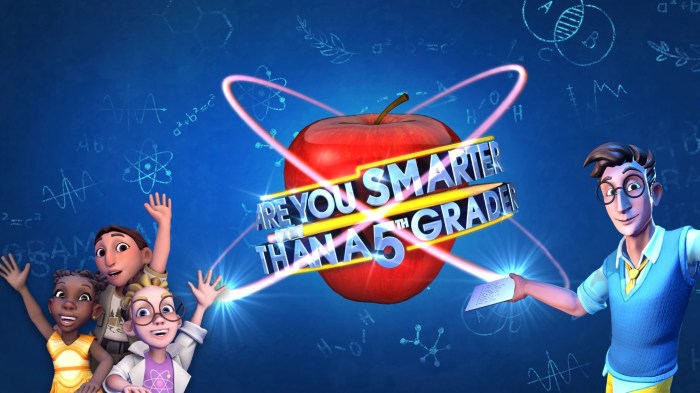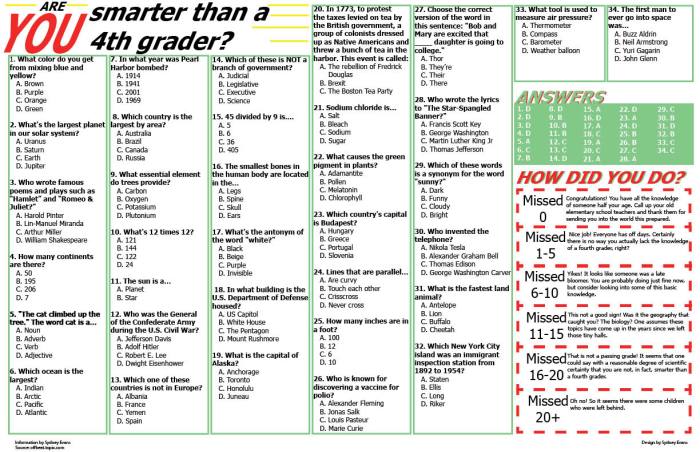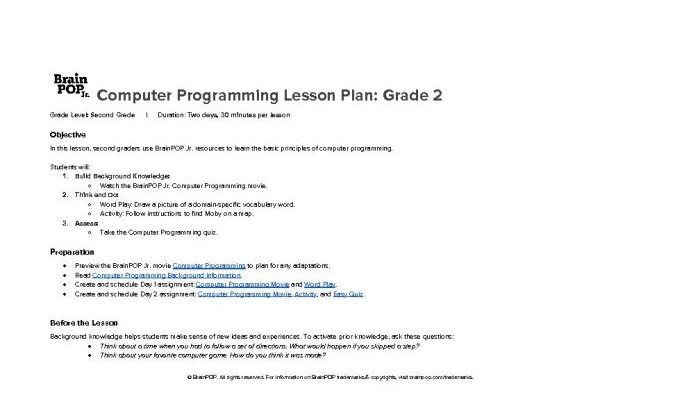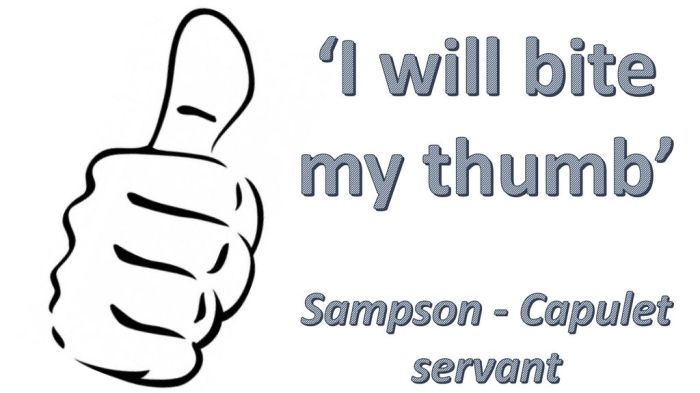Are you smarter than a fourth grader? This question has been posed for decades, sparking curiosity and debate. In this article, we will delve into the concept of “being smarter than a fourth grader,” exploring the cognitive abilities of fourth graders, comparing them to adults, and discussing the educational implications of understanding these differences.
The fourth-grade curriculum serves as a benchmark for assessing cognitive development, covering core subjects and topics that challenge students to develop essential skills and knowledge.
Definitions and Concepts
The concept of “being smarter than a fourth grader” refers to the assumption that an individual possesses a level of intelligence comparable to or exceeding that of a typical fourth-grade student.
Tasks and challenges commonly associated with fourth-grade intelligence include:
- Reading and comprehending complex texts
- Solving mathematical problems involving multiplication, division, fractions, and decimals
- Writing clear and concise essays
- Understanding basic scientific concepts
Measurement and Assessment of Intelligence
Intelligence can be measured and assessed through various methods, including:
- Standardized intelligence tests (e.g., IQ tests)
- Academic performance (e.g., grades, test scores)
- Problem-solving abilities
- Creative thinking
- Social and emotional intelligence
Fourth Grade Curriculum

The fourth-grade curriculum is a pivotal stage in a child’s academic journey, building upon the foundation established in earlier grades while introducing more complex concepts and fostering critical thinking skills.
This curriculum encompasses a wide range of core subjects, including:
- Language Arts:Reading, writing, grammar, spelling, vocabulary
- Mathematics:Number operations, measurement, geometry, data analysis
- Science:Life sciences, physical sciences, earth sciences
- Social Studies:History, geography, civics
Cognitive Skills and Abilities
Fourth graders are expected to exhibit significant cognitive growth, demonstrating:
- Improved reading comprehension and fluency
- Enhanced problem-solving and critical thinking abilities
- Increased ability to organize and synthesize information
- Greater independence and self-direction in learning
Learning Objectives and Developmental Milestones
The fourth-grade curriculum aims to facilitate the achievement of specific learning objectives, including:
- Developing a strong foundation in reading and writing
- Gaining proficiency in basic mathematical operations
- Understanding the fundamental principles of science
- Exploring key historical events and concepts
Moreover, fourth graders are expected to reach certain developmental milestones, such as:
- Becoming more responsible and organized
- Developing a sense of independence and self-confidence
- Exhibiting increased social and emotional maturity
Cognitive Abilities and Intelligence

Intelligence is a complex and multifaceted construct that encompasses a wide range of cognitive abilities. These abilities include:
- Reasoning: The ability to think logically and solve problems.
- Problem-solving: The ability to identify and solve problems.
- Memory: The ability to encode, store, and retrieve information.
- Attention: The ability to focus and sustain attention.
- Language: The ability to understand and use language.
- Spatial reasoning: The ability to understand and manipulate spatial relationships.
- Perceptual speed: The ability to quickly and accurately perceive and process information.
These cognitive abilities develop and change throughout childhood. In general, children’s reasoning, problem-solving, and memory abilities improve as they get older. Their attention and language abilities also develop rapidly during the early years of childhood. Spatial reasoning and perceptual speed abilities tend to develop more gradually throughout childhood and adolescence.
Cognitive Tasks to Assess Intelligence in Children, Are you smarter than a fourth grader
There are a variety of cognitive tasks that can be used to assess intelligence in children. These tasks typically measure one or more of the cognitive abilities listed above. Some common cognitive tasks used to assess intelligence in children include:
- Raven’s Progressive Matrices: A nonverbal test of reasoning and problem-solving.
- Wechsler Intelligence Scale for Children: A comprehensive test of intelligence that measures a variety of cognitive abilities, including reasoning, problem-solving, memory, attention, language, and spatial reasoning.
- Stanford-Binet Intelligence Scale: Another comprehensive test of intelligence that measures a variety of cognitive abilities, including reasoning, problem-solving, memory, attention, language, and spatial reasoning.
These are just a few of the many cognitive tasks that can be used to assess intelligence in children. The choice of task will depend on the specific purpose of the assessment.
Comparison and Contrast: Are You Smarter Than A Fourth Grader
Cognitive abilities encompass a wide range of mental processes, including perception, attention, memory, language, problem-solving, and decision-making. These abilities undergo significant development throughout childhood and adolescence, with fourth graders exhibiting distinct cognitive profiles compared to adults.
Areas of Cognitive Strength and Weakness
Fourth graders typically excel in certain cognitive areas compared to adults. They possess:
- Enhanced perceptual skills:Fourth graders have sharper visual and auditory perception, allowing them to detect and process sensory information more efficiently.
- Stronger episodic memory:They have a remarkable ability to recall specific events and experiences from their personal lives.
- Increased creativity and imagination:Their cognitive flexibility enables them to generate novel ideas and explore different perspectives.
However, fourth graders also exhibit certain cognitive weaknesses compared to adults:
- Limited working memory capacity:They can hold and manipulate a smaller amount of information in their working memory, affecting their ability to solve complex problems.
- Weaker logical reasoning skills:Their ability to reason abstractly and draw inferences is still developing, making it challenging to solve problems requiring logical analysis.
- Reduced metacognitive awareness:They have less insight into their own cognitive processes, limiting their ability to self-regulate and monitor their performance.
Factors Contributing to Differences
Several factors contribute to the cognitive differences between fourth graders and adults:
- Brain development:The brain undergoes significant structural and functional changes during childhood, leading to improvements in cognitive abilities.
- Experience and learning:Fourth graders have accumulated less life experience and formal education compared to adults, affecting their knowledge base and problem-solving skills.
- Maturation:Cognitive abilities continue to mature throughout adolescence and early adulthood, reaching their peak in young adulthood.
Educational Implications

Understanding the cognitive abilities of fourth graders is crucial for optimizing teaching practices and curriculum design. By tailoring instruction to their cognitive strengths and areas for improvement, educators can foster their academic and intellectual growth.
Implications for Teaching Practices
- Promote Active Learning:Engage students in hands-on activities, discussions, and problem-solving exercises to enhance their understanding and retention.
- Incorporate Visual Aids:Utilize charts, diagrams, and manipulatives to make abstract concepts more concrete and accessible to fourth graders.
- Encourage Collaboration:Facilitate group projects and peer learning opportunities to develop their communication, problem-solving, and social skills.
Implications for Curriculum Design
- Focus on Conceptual Understanding:Prioritize the development of deep comprehension over rote memorization by providing opportunities for students to explore concepts in multiple ways.
- Integrate Real-World Applications:Connect learning to practical situations to make it more meaningful and engaging for students.
- Provide Differentiated Instruction:Adapt instruction to meet the individual needs of students, providing additional support or challenges as necessary.
Recommendations for Supporting Cognitive Development
- Create a Stimulating Learning Environment:Provide ample opportunities for exploration, play, and creativity to foster curiosity and intellectual growth.
- Encourage Critical Thinking:Ask open-ended questions, engage students in discussions, and provide puzzles or brain teasers to develop their problem-solving and analytical skills.
- Promote Reading Comprehension:Emphasize the importance of reading and provide access to a wide range of texts to enhance their vocabulary, comprehension, and inferencing abilities.
FAQ Corner
What are the core subjects typically covered in the fourth-grade curriculum?
The fourth-grade curriculum typically includes core subjects such as math, reading, writing, science, and social studies.
How are cognitive abilities measured and assessed in children?
Cognitive abilities in children can be measured and assessed through various methods, including standardized testing, observation, and performance-based tasks.
What are the key cognitive skills and abilities expected of fourth graders?
Fourth graders are expected to demonstrate cognitive skills and abilities such as problem-solving, critical thinking, memory, attention, and language comprehension.

